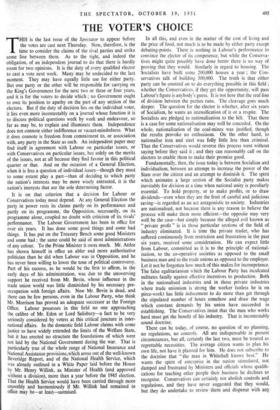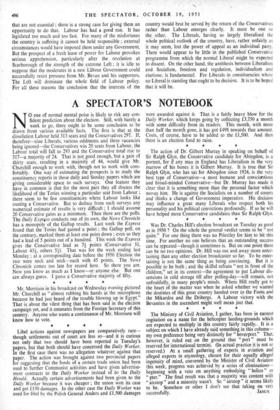THE VOTER'S CHOICE
THIS is the last issue of the Spectator to appear before the votes are cast next Thursday. Now, therefore, is the time to consider the claims of the rival parties and strike some line between them. As to the right, and indeed the obligation, of an independent journal to do that there is hardly room for two opinions. It is the duty of every qualified elector to cast a vote next week. Many may be undecided to the last moment. They may have equally little use for either party. But one party or the other will be responsible for carrying on the King's Government for the next two or three or four years, and it is for the voters to decide which ; no Government ought to owe its position to apathy on the part of any section of the electors. But if the duty of decision lies on the individual voter, it lies even more incontestably on a journal whose function it is to discuss political questions week by week - and endeavour, so far as may be, to explain and illuminate them. Independence does not connote either indifference or vacant-mindedness. What it does connote is freedom from commitment to, or association with, any party in the State as such. An independent paper may find itself- in agreement with Labour on particular issues, or with Conservatives on particular issues, but solely on the merits of the issues, not at all because they find favour in this political quarter or that. And on the occasion of a General Election, when it is less a question of individual issues—though they must to some extent play a part—than of deciding to which party the nation's interests may be more wisely entrusted, it is the nation's interests that are the sole determining factor.
It is on that criterion that a decision for Labour or Conservatives today must depend. At any General Election the party in power rests its claims partly on its performance and partly on its programme, the Opposition, necessarily, on its programme alone, coupled no doubt with criticism of its rivals' performance. The Labour. Government has been in office for over six years. It has done some good things and some bad things. It has put on the Treasury Bench some good Ministers and some bad ; the same could be said of most administrations of any colour. To the Prime Minister it owes much. Mr. Attlee has shown himself in office an abler and more authoritative politician than he did when Labour was in Opposition, and he has never been willing to lower the tone of political controversy. Part of his success, as he would be the first to affirm, in the early days of his administration, was due to the unswerving support he received from Mr. Bevin, whose influence in the trade union world was little diminished by his necessary pre- occupation with foreign affairs. Now Mr. Bevin is dead, and there can be few persons, even in the Labour Party, who think Mr. Morrison has proved an adequate successor at the Foreign Office. Labour possesses in this field no one apprdaching the calibre of Mr. Eden or Lord Salisbury—a fact to be very seriously considered by voters at this critical juncture in inter- national affairs. In the domestic field Labour claims with some justice to have widely extended the limits of the Welfare State, but it has erected no structure the foundations of which were not laid by the National Government during the war. That is particularly true of the whole range of National Insurance and National Assistance provisions, which arose out of the well-known Beveridge Report, and of the National Health Service, which was already outlined in a White Paper laid before the House by Mr. Henry Willink, as Minister of Health (and approved without a division), more than a year before the 1945 election. That the Health Service would have been carried through more smoothly and harmoniously if Mr. Willink had remained in office may be—at least—surmised. In all this, and even in the matter of the cost of living and the price of food, not much is to be made by either party except debating-points. There is nothing in Labour's performance to convince the elector of its competence, but while the Conserva- tives might quite possibly have done better there is no way of proving that they would. Similarly in regard to housing. The Socialists have built some 200,000 houses a year ; the Con- servatives talk of building 300,000. The truth is that either party can be counted on to do everything possible in this field ; whether the Conservatives, if they get the opportunity, will pass Labour's figure is anybody's guess. It is not here that the real line of division between the parties runs. The cleavage goes much deeper. The question for the elector is whether, after six years of Socialism, he wants an intensification of it or a respite. The Socialists are pledged, to nationalisation to the hilt. That there is a case for some nationalisation may well be conceded. On the whole, nationalisation of the coal-mines was justified, though the results provoke no enthusiasm. On the other hand, to nationalise iron and steel was folly little less than criminal. That the Conservatives would reverse this process went without saying before they said it ; and they can reasonably call on the electors to enable them to make their promise good.
Fundamentally, then, the issue today is between Socialism and individualism, between an attempt to increase the power of the State over the citizen and an attempt to diminish it. The spirit which animates a large section of the Socialist party makes inevitably for division at a time when national unity is peculiarly essential. To hold property, or to make profits, or to draw dividends—even when they are the fruit of careful and judicious saving—is regarded as an act antagonistic to society. Industries are nationalised, not because there is any reason to believe the process will make them more efficient—the opposite may very well be the case—but simply because the alleged evil known as " private profit " is in those particular sections of the field of industry eliminated. It is time the private trader, who has suffered continuously from restriction and frustration in the past six years, received some consideration. He can expect little from Labour, committed as it is to the principle of national- isation, to the co-operative societies as opposed to the small business man and to the trade unions as opposed to the employer. Let it not be forgotten how much of this makes for incompetence. The false egalitarianism which the Labour Party has inculcated militates fatally against effective incentives to production. Both in the nationalised industries and in those private industries where trade unionism is strong the worker (unless he is on piece-work) has little inducement to do more than get through the stipulated number of hours somehow and draw the wage which constant demands by his union have succeeded in establishing. The Conservatives insist that the man who works hard must get the benefit of his industry. That is incontestably sound doctrine.
There can be today, of course, no question of no planning, no regulations. no controls. All are indispensable in present circumstances, but all, certainly the last two, must be treated as regrettable necessities. The average citizen wants to plan his own life, not have it planned for him. He does not subscribe to the doctrine that " the man in Whitehall knows best." He wants the spirit of enterprise in the nation stimulated,. not damped and frustrated by Ministers and officials whose qualifi- cations for teaching other people their business he declines to recognise. Conservatives can certainly not abolish controls and regulations, and they have never suggested that they would, but they do undertake to review them and dispense with any that are not essential ; there is a strong case for giving them an opportunity to do that. Labour has had a good run. It has legislated too much and too fast. For many of the misfortunes the country is suffering it cannot be held responsible ; external circumstances would have imposed them under any Government. But the prospect of a fresh lease of power for Labour provokes serious apprehension, particularly after the revelation at Scarborough of the strength of the extreme Left ; it is idle to suppose that the moderates in a new Labour Government could successfully resist pressure from Mr. Bevan and his supporters. The Left will dominate the whole field of Labour policy. For all these reasons the conclusion that the interests of the country would- best be served by the return of the Conservatives rather than Labour emerges clearly. It must be one or the, other. The Liberals, having so largely liberalised the whole political outlook of the country, have, rather unfairly as it may seem, lost- the power of appeal as an individual party. There would appear to be little in the published Conservative programme from which the normal Liberal might be expected to dissent. On the other hand, the antithesis between Liberalism and Socialism, freedom and regulation, individualism and etatisme, is fundamental. For Liberals in constituencies where no Liberal is standing that ought to be decisive. It is to be hoped that it will be.



































 Previous page
Previous page